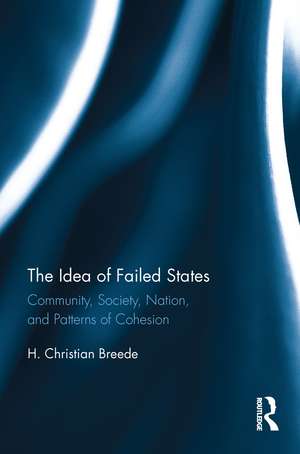The Idea of Failed States: Community, Society, Nation, and Patterns of Cohesion
Autor H. Breedeen Limba Engleză Hardback – 10 aug 2017
The question of why some states are strong and others weak has traditionally been addressed using measures of economic growth, resources, and quality of life. This book compares the dimensions of state strength characterised by community, society, and nation and uses social capital concepts to further illuminate them. Applying this approach across forty-two countries shows ‘weak’ states exhibiting a consistent and unique patterns of relationships between community, society, and nation as well as equally consistent and unique relationships in strong states. A blend of theory and empirics, The Idea of Failed States present a new way to think about the state – one that applies to both strong and weak alike.
This work should be of interest to students and scholars researching social capital, public policy, international development and security studies.
| Toate formatele și edițiile | Preț | Express |
|---|---|---|
| Paperback (1) | 375.43 lei 43-57 zile | |
| Taylor & Francis – 30 sep 2021 | 375.43 lei 43-57 zile | |
| Hardback (1) | 1033.34 lei 43-57 zile | |
| Taylor & Francis – 10 aug 2017 | 1033.34 lei 43-57 zile |
Preț: 1033.34 lei
Preț vechi: 1260.17 lei
-18% Nou
Puncte Express: 1550
Preț estimativ în valută:
197.76€ • 205.42$ • 164.27£
197.76€ • 205.42$ • 164.27£
Carte tipărită la comandă
Livrare economică 03-17 februarie 25
Preluare comenzi: 021 569.72.76
Specificații
ISBN-13: 9781138716391
ISBN-10: 1138716391
Pagini: 200
Ilustrații: 18 Line drawings, black and white; 10 Tables, black and white; 19 Illustrations, black and white
Dimensiuni: 156 x 234 x 13 mm
Greutate: 0.45 kg
Ediția:1
Editura: Taylor & Francis
Colecția Routledge
Locul publicării:Oxford, United Kingdom
ISBN-10: 1138716391
Pagini: 200
Ilustrații: 18 Line drawings, black and white; 10 Tables, black and white; 19 Illustrations, black and white
Dimensiuni: 156 x 234 x 13 mm
Greutate: 0.45 kg
Ediția:1
Editura: Taylor & Francis
Colecția Routledge
Locul publicării:Oxford, United Kingdom
Public țintă
PostgraduateCuprins
Chapter 1 – Introduction: The Puzzle of Failed States
Chapter 2 – Measuring Failure or Capability?
Chapter 3 – Concepts of Cohesion
Chapter 4 – Bringing in Social Capital
Chapter 5 – Social Capital Challenges and the Centrality of Trust
Chapter 6 – The Idea and a Measure of the Nation
Chapter 7 – The Idea and a Measure of Community and Society
Chapter 8 – What a Failed State Looks Like
Conclusion: New Approaches
Appendix: Measuring Cohesion – Alternatives and Method
Chapter 2 – Measuring Failure or Capability?
Chapter 3 – Concepts of Cohesion
Chapter 4 – Bringing in Social Capital
Chapter 5 – Social Capital Challenges and the Centrality of Trust
Chapter 6 – The Idea and a Measure of the Nation
Chapter 7 – The Idea and a Measure of Community and Society
Chapter 8 – What a Failed State Looks Like
Conclusion: New Approaches
Appendix: Measuring Cohesion – Alternatives and Method
Notă biografică
H. Christian Breede is an Assistant Professor of Political Science at the Royal Military College of Canada (RMCC) and a serving officer in the Canadian Armed Forces. Concurrent with this appointment, he is also a Deputy Director of the Centre for International and Defence Policy and a cross-appointed Assistant Professor of Political Studies at Queen’s University. He completed his PhD in War Studies at RMCC. Prior to his PhD studies, he served in a variety of command and staff positions within the Canadian Armed Forces as an Infantry Officer deploying to both Haiti (2004) and Afghanistan (2008-9). His research interests include state capability as it relates to international security and the connection between the soldier and the citizen.
Recenzii
"A thought-provoking exploration of the social foundations of strong and weak states, wide-ranging in its scholarly sweep and enlivened by the author’s direct experiences as a soldier deployed to Haiti and Afghanistan." - Roland Paris, University Research Chair in International Security and Governance, University of Ottawa.
Descriere
This book compares the dimensions of state strength characterised by community, society, and nation. By exploring factors related to social cohesion the author demonstrates how the concept of social capital can be used as an analytical tool to measure state strength empirically.
